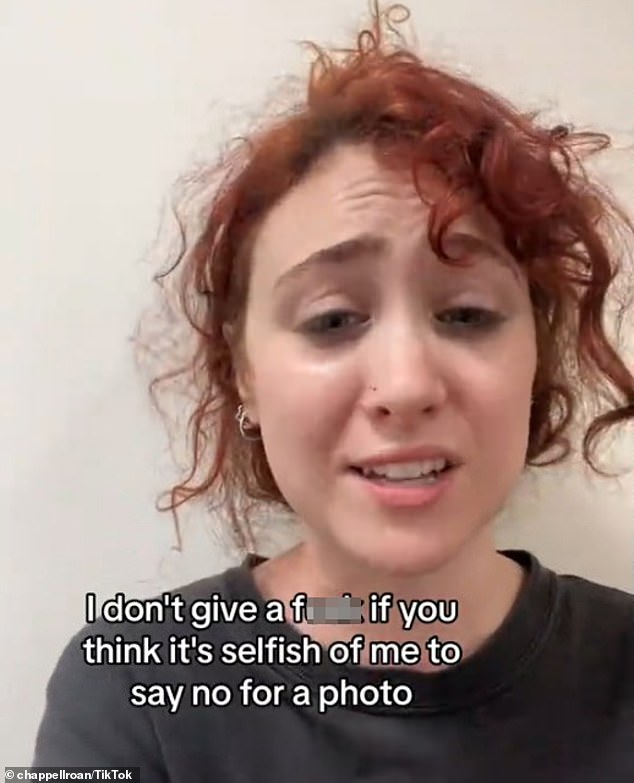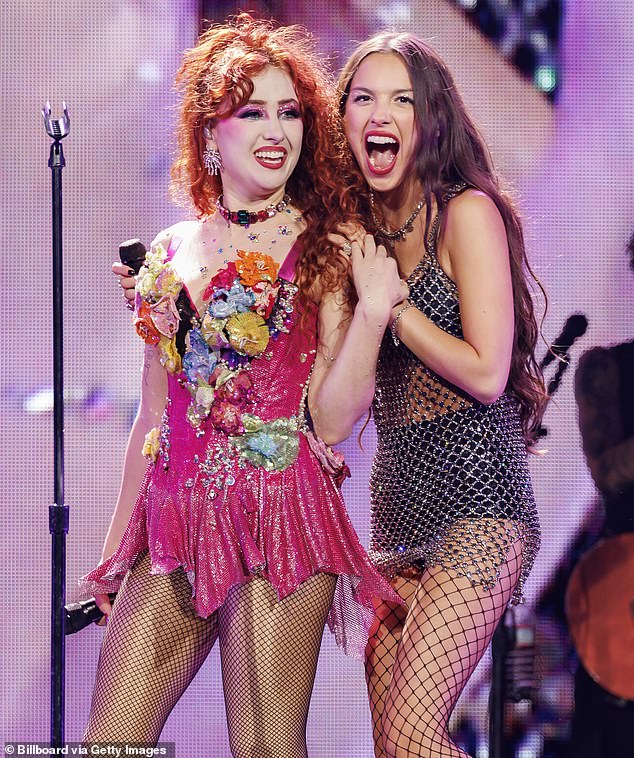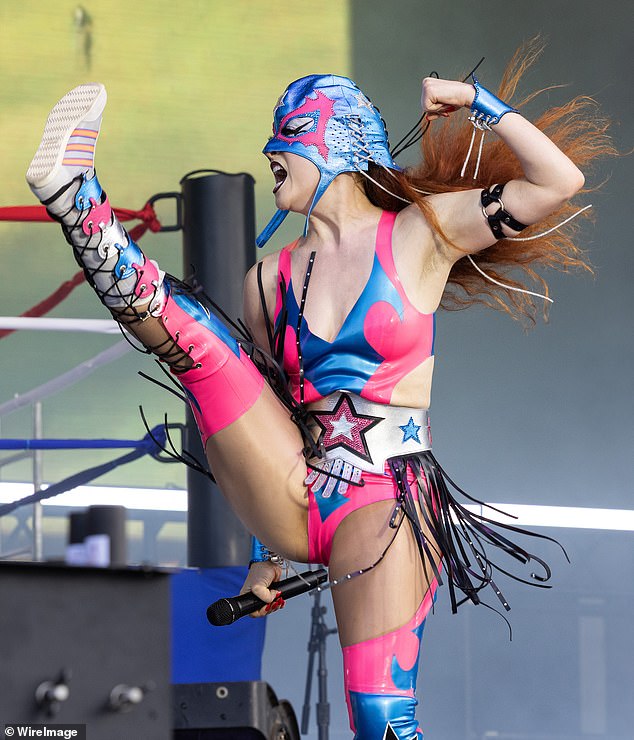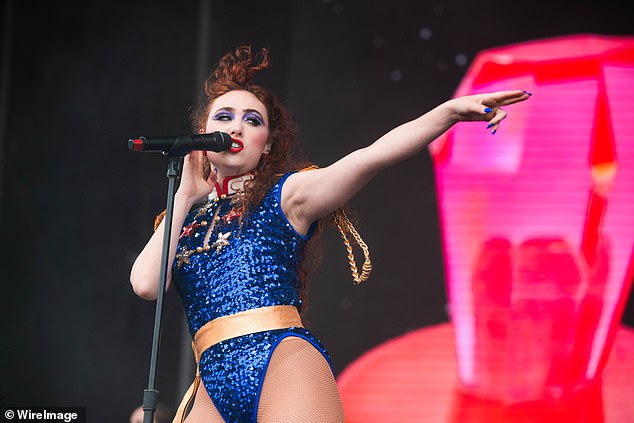She’s at the top of her career, just as she’s always wanted, but suddenly, ‘Pink Pony Club’ singer-songwriter Chappell Roan is asking her adoring fans to slow down.
Hailed as the new Lady Gaga after her hit album catapulted her to overnight fame, the 26-year-old Missouri native was a relative unknown at the start of the year.
Currently, she tops all the major global music charts, performing in New York City and at major festivals, drawing crowds of over 100,000 people.
She’s been releasing music since 2014 and is finally the focus of adulation 24/7, something she says is “all I’ve ever wanted.”
But she also seems to have quickly adopted a diva attitude to adapt to the size of her newfound celebrity.
She’s at the top of her career, just as she’s always wanted, but suddenly, ‘Pink Pony Club’ singer-songwriter Chappell Roan is asking her adoring fans to slow down.

She also seems to have quickly adopted a diva attitude to adapt to the size of her newfound celebrity.
In a series of social media posts, Roan said she’s “tired” of the attention that comes with a breakthrough, particularly when she’s “not in work mode” and “disconnected.”
You see, just like every other lanyard-wearing, nine-to-five-working person, when she finishes her viral Coachella performance, opening for Olivia Rodrigo, or performing on Jimmy Fallon’s Tonight Show, this Madonna wannabe is hoping for some peace and darkness.
Well, to refer to her latest hit: Good luck, babe!
It turns out that the feverish devotion of a carefully cultivated fan base that propels you from obscurity to great fame is hard to control.
Fans want hugs and selfies, autographs or the chance to simply shout a few words of praise to their new icon.
“I don’t agree with the idea that I owe a mutual exchange of energy, time, or attention to people I don’t know, trust, or who give me the creeps, just because they express admiration,” she wrote in a lengthy post, after telling her fans that she doesn’t give a shit if that makes her “selfish.”
“I’m specifically referring to the predatory behavior (disguised as ‘superfan’ behavior) that has been normalized by the way high-profile women have been treated in the past,” she added.
Okay, it’s true that some superfans get too involved, and bullying should never be tolerated.
But if Roan feels insecure, maybe she needs to reinforce her personal security, because this is, as they say, normal.
While you’re at it, how about hiring a new PR team before fans, the vast majority of whom will be well-meaning people, lose interest in the “Hot to Go!” singer?

Like any other nine-to-five worker with a cord, when she finishes her Coachella performance or opens a concert for Olivia Rodrigo (right), this Madonna wannabe hopes for a little peace and darkness.
Because Roan’s outburst at the flip side of fame betrays an ugly intolerance and unfortunate ignorance about the industry he’s chosen to dominate.
“It’s weird how people think they know a person because they see them online and hear the art they create,” he mused.
There is nothing stranger than your own sudden change of direction.
On the way up, she was happy to share too much with the great everyday people, talking about her demons, her “public” drug use and how “damn bad she is,” as she put it on a recent podcast.
Nothing was off limits, wrapped up in its role as “authentic.” So is it really a surprise that many who now enjoy it feel like they know it?
Like other stars currently dominating culture (Taylor Swift, Sabrina Carpenter, Olivia Rodrigo), Roan’s success has been built on an intense bond created between her and her fan base.
But here lies the old duplicity of so many celebrities with a right to everything and their predictable slap in the face to the fans who represent the oxygen that feeds their privileged lives.
Blake Lively’s sneering, mean girl routine as she promotes her latest romantic comedy is a prime example of this: it’s called losing perspective… and the plot.

On the way up, she was happy to hang out with regular folks, talking about her demons, her “public” drug use and being a “fucking crazy person,” as she put it on a recent podcast.
Fame brings riches, validation, and opportunities that are far beyond the reach of the average citizen, but any job has its downsides and we all have to grow up and accept that sometimes.
Many will be surprised by Roan’s stance, particularly given how hard it has been to achieve his success.
Kicked out of her record label in 2020 and forced to work at a donut shop, she almost had to give up on her dream.
In a pop landscape led by Swift, Roan’s ’80s-inspired synth hits certainly offer something new. From the drag-inspired aesthetic to his superior vocals and a body positivity that doesn’t stray into OnlyFans-style sleaze, he’s got a lot to sell.
Her identity as a positive lesbian role model is one she controls and celebrates on her own terms, rather than the sapphic fantasy that male producers often impose on straight pop puppets.
There’s also a refreshing lack of false modesty and that irritating, silly imposter syndrome that many female stars claim to have. In a recent interview, she joked: “You never really know if your art is any good; just kidding, I knew it.”
The question is: Was she really prepared for everything that would come with that meteoric success?
(tags to translate)dailymail


